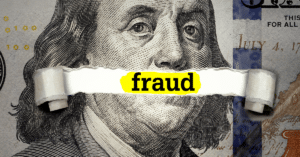The Hidden Crisis: Healthcare Fraud in Medicare Advantage
When most people hear about healthcare fraud, they think of doctors and hospitals exploiting the system. However, significant concerns have been raised about private insurance companies contracted to manage Medicare and Medicaid.
Many of these insurance companies have manipulated the system for years by inflating diagnoses or misrepresenting beneficiaries’ health conditions to receive extra or undeserved payments from the federal government. This is a scheme known as risk adjustment fraud.
For healthcare professionals, understanding and addressing Medicare fraud is crucial. By recognizing fraud schemes and knowing the steps to take, you can play a pivotal role in protecting both patients and public resources.
What is Risk Adjustment Fraud?
Risk adjustment fraud occurs when Medicare Advantage (MA) insurers exaggerate a patient’s risk adjustment factor score or falsify the severity of a patient’s medical conditions to increase government reimbursements.
Medicare uses a risk adjustment model to allocate more funding to insurers covering sicker patients, but some companies exploit this system by inflating diagnoses or submitting inaccurate health data to maximize their payments.
This fraudulent practice has resulted in billions of dollars in overpayments to private insurers.
MedPAC Report: A Broken System
A recent report to Congress by the Medicare Payment Advisory Commission (MedPAC) highlighted serious flaws in the Medicare Advantage (MA) program. Originally designed to reduce healthcare costs, MA has failed to achieve anticipated savings compared to traditional fee-for-service (FFS) Medicare.
Managed care was first enacted in 1997 under the Balanced Budget Act, introducing Medicare+Choice, which later became Medicare Advantage (MA) in 2003 under the Medicare Prescription Drug, Improvement, and Modernization Act. The goal was to control costs and improve healthcare quality by allowing private insurers to compete with traditional Medicare. However, evidence has shown that Medicare Advantage has not resulted in expected cost savings, but instead increased government spending.
Key findings from MedPAC’s analysis include:
- Medicare spends 22% more on MA enrollees than on those in FFS Medicare, leading to an estimated $83 billion in additional annual expenditures.
- In 2022, MA risk scores were about 11% higher than they would have been if enrollees were in FFS Medicare. This discrepancy, known as coding intensity, results in inflated payments to MA plans.
A Call for Medicare Reform
These findings raise serious concerns about the effectiveness and sustainability of Medicare Advantage. Without stronger oversight and regulatory reforms, taxpayer dollars will continue to be wasted, and the integrity of the Medicare system will remain at risk.
So, what can healthcare professionals do to address these challenges? Here are a few actionable steps you can take to make a difference.
The Healthcare Worker’s Role in Combating Medicare Advantage Fraud
Healthcare professionals are often the first to notice billing irregularities, giving them an important role in identifying and addressing Medicare Advantage fraud. If you suspect unethical practices, here’s what you can do:
- Identify and Document Suspicious Activity
Pay close attention to patterns that don’t add up, such as discrepancies between services provided and treatments billed. If you suspect fabricated diagnoses or unethical pressure to alter documentation, keep detailed and confidential notes that can later support an investigation. - Notice Signs of Workplace Pressure
Recognize that unethical practices, such as being urged to document additional false diagnoses, can occur even in trusted workplaces. Understanding your rights and legal protections makes it easier to resist these pressures while adhering to professional integrity. - Seek Guidance from a Whistleblower Attorney
Consulting a whistleblower attorney is one of the most effective moves you can make. They’ll ensure your actions remain confidential and help build a solid case. Whistleblower attorneys specialize in navigating fraud cases and can offer the support needed to move forward confidently.
Why Reporting Medicare Fraud Matters
Medicare Advantage fraud damages the quality of healthcare, stealing funds meant to care for vulnerable patients. Your decision to act protects patients, restores integrity, and ensures taxpayer dollars are spent ethically. Whistleblower cases have led to billions in recoveries, holding fraudsters accountable and deterring future abuse.
If you suspect fraud, it’s crucial to reach out for help. Consulting a whistleblower attorney ensures your concerns are handled confidentially, with expert guidance every step of the way. At DJO Whistleblower Law Firm, we don’t get paid unless your case is successful. Whistleblowers could earn up to 30% of any recovered funds, often amounting to millions of dollars in rewards. Contact us today for a free consultation.


